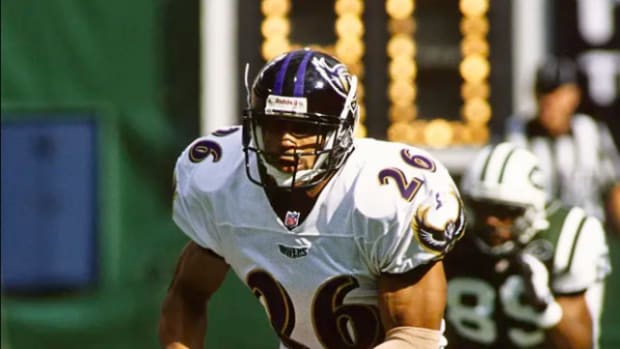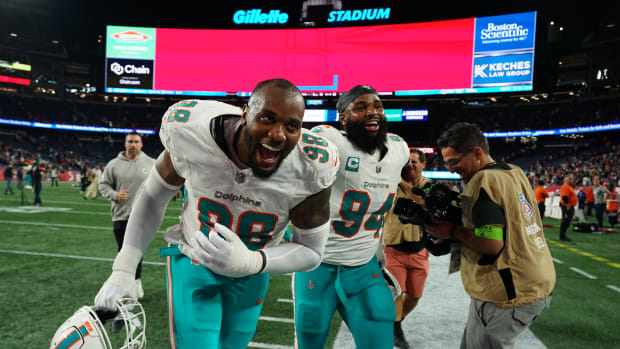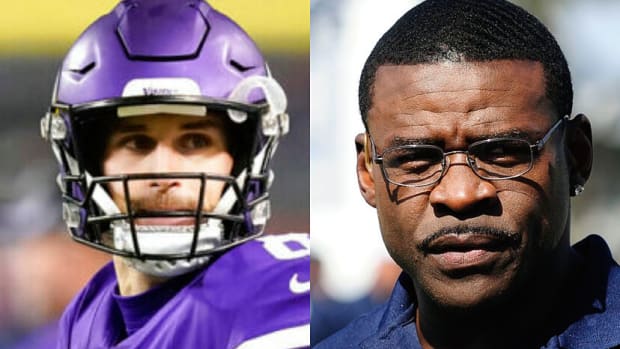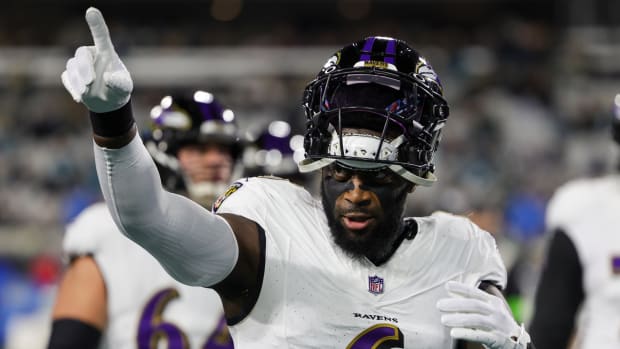Why Firing Mike McCarthy Was Necessary for the Packers
Former Browns teammates Joe Thomas and Andrew Hawkins will be teaming up this year to provide analysis on the NFL season from the perspective of two former players. In this week’s ThomaHawk Thoughts, they share their opinions on Mike McCarthy’s firing in Green Bay, what the league has learned from the Kareem Hunt situation and what keeps players motivated when their team is out of playoff contention.
What did you think of the timing of Mike McCarthy’s firing in Green Bay? Was it the right choice?
Thomas: I thought the decision to fire Mike McCarthy mid-season was actually done in McCarthy’s best interest. Now he doesn’t have to stand up there and swing in the breeze for the rest of the season answering questions about his future while everyone in the organization knew that he was going to get fired no matter what happened.
Hawkins: I agree that the Packers needed to make a change at head coach. The biggest problem is that McCarthy's message got stale. I don’t care how motivating a head coach can be, but after a while the message, the analogies, everything grows stale because players have heard it so many times. For any coach that wants to have a long tenure in the NFL, it’s always important to reset your roster—even championship teams win and then blow their roster up not only because they know how hard it is to duplicate that, but also to keep the personalities in check.
The Seahawks under Pete Carroll had to reset their roster. On our podcast, Richard Sherman said that everyone there had already heard everything from Carroll. There are only so many times you can tell these stories before it doesn’t resonate anymore. In college, turnover is built into the infrastructure. Players are constantly coming and going, which makes it easy for college coaches to stay fresh. In the NFL it’s just hard.
When I got to Cincinnati in 2011, Marvin Lewis had just reset the roster. A.J. Green was a rookie, Andy Dalton was a rookie, I was new, everybody was new. Carson Palmer was gone, Chad Ochocinco was gone, all those other guys were gone. That season was a resurgence, and the team came on the scene out of nowhere and made the playoffs because Lewis had control of the locker room. It was a new day there. With McCarthy, I think his coaching had run its course. To top it off, he lost the No. 1 person in the locker room, the one who you can’t reset—Aaron Rodgers. Once you lose that guy as a supporter, it is probably time to go.
KAHLER: How It All Went Wrong for the Packers This Season
Thomas: The only coach that hasn’t gotten stale in my lifetime is Patriots’ Bill Belichick. Belichick has a unique way of motivating people with fear—the fear of losing your job is a very effective motivator. Belichick will call out guys for poor play, as a way to humiliate you and get you to perform better. We did it in Cleveland when Romeo Crennel was Browns head coach, we called it The RAC show, because that was his nickname. When Eric Mangini coached the Browns, we called it Penguin Vision, because people used to tease Eric that he looked like a penguin. We’d spend almost an hour of every day watching the bad clip from the previous practice.
Not only does Belichick still do that to this day—part of the reason he rubs some people the wrong way—but he also de does it to everybody. He treats everyone the same way, and I think that’s why he hasn’t gotten stale. Players and coaches can get more comfortable the longer they are around each other, and when you get comfortable sometimes the details slip. When you switch up a coach, people sit up a little straighter in their chair and start taking care of details again and you start seeing a better performance on the field.
Hawkins: Neither of us have been on a team where the head coach was fired midseason, so we don’t know personally know what that is like. But based on reports, the Green Bay players said that his playcalling was stale adn that there was a rift between him and Rodgers. Honestly, that might explain why we saw the play elevate in Week 14 in the Packers’ 34–20 win over Atlanta. I see that often when a quarterback is benched, like with the Jaguars. Blake Bortles is not playing any different this season than last season—by the numbers, it’s very similar. The biggest difference is their defense, which isn’t as stout as it was a year ago. Cody Kessler didn’t come out and light it up, but you could sense a shift in motivation in the team. The defense was playing better, they rallied together as a team.
Thomas: The reason coaches are so obsessed with what the media writes about them is because perception turns into reality, even what the fans start thinking matters. In this case, the perception was that Mike McCarthy’s offense was stale and had run its course, and when that sort of mentality leaps into the locker room, a coach becomes less effective. Players develop a perception that the coach isn’t as sharp he used to be, and the mentality slides from here: Oh, I think this coach is going to get fired, I don’t have to sell out and give everything I have anymore. Once the coach does get fired, then the players don’t have an excuse anymore, and they realize they are the ones under the microscope, and they want to keep their job so they pick up their play. I think that’s why a lot of times when a coach gets fired, you see the interim coach having success right away.
BRANDT: Behind the Green and Gold Curtain: An Insider’s View of Mike McCarthy and the Packers
What is your takeaway from Kareem Hunt’s release?
Thomas: Players in the league are starting to understand the zero tolerance for assault and domestic violence. Unfortunately in this situation the NFL seemed to turn a blind eye to something that they knew happened, but when the video came out in public, players probably fully expected that this was going to be the outcome right away. While they wish Hunt luck moving forward, I don’t think anybody was surprised. The NFL week happens so quickly, you wake up Monday, you review the film, you go to workouts, team meetings, Tuesday is family day, and then Wednesday you are so focused on getting back to the grind and the next opponent that you don’t really have time to think about what happened.
Hawkins: The NFL constantly gets in trouble over how there is never any consistency in what they do. It sets precedents and create expectations in places it probably shouldn’t. It puts its hands in cookie jars that it shouldn’t. In this instance, we don’t know when it should act as an investigative branch or not. Is there a department for this? We don’t know what constitutes a yearlong investigation like Ezekiel Elliott’s case, and what doesn’t. People want to see consistency from the NFL, and it hasn’t delivered. The NFL investigated Elliott’s situation inside and out—why hasn’t it been the same with Hunt’s situation?
Thomas: Now, let’s not fool ourselves into thinking the NFL doesn’t have incredible law enforcement and detective abilities at their fingertips. There is NFL security in every NFL city, and all these people are liaisons to law enforcement—they are all mostly former law enforcement, former FBI, former CIA. They were hired because of their contacts within their law enforcement branches. In the old days, if there was an issue, they would work things out with local police department and no one would hear about it. Now it’s moved into something a little bit different than that, the investigative side of things. They have a really strong ability to find out what happened. They have more than enough ability to get to the bottom of this type of stuff if they want, but they didn’t even go to the low bar of trying to talk to Hunt or trying to get a video of the incident.
If you want the latest episode of The Monday Morning NFL Podcast in your feed when you wake up Monday morning, then subscribe to The MMQB Podcasts. (For non-subscribers, there is typically a lag.)
Will Hunt play again?
Thomas: I originally thought Hunt would never play again. But honestly, he is so young that I think once enough time has passed and he has shown contrition, and gone through a program to prove he has learned his lesson, he’ll be back. It will be a little bit like the Michael Vick situation, where he might be out for a year or two, but he is so young and talented that I think after enough time has passed a team will take a shot at him.
Hawkins: Joe always says, production breeds tolerance. He is only 23 years old and super talented, so even if he took two or three seasons off, he’s still only 25 or 26. I think someone will definitely sign him and give him that opportunity. He has to show why he would deserve that second chance, that he understands what he did wrong and why it was such a problem. He needs to do something positive about the topic violence against women and assault against women. Honestly, I know for a fact there was a team close to signing Ray Rice and then something happened outside of that situation that stopped it. In the midnight hour something happened, and Ray Rice was a guy who was already past his prime. Kareem, he is so young that he will get back, he just has to make sure he proves why he deserves it.
You both know what it is like to play on a team that is well out of playoff contention by this time of year, When a team is out of playoff contention, what motivates guys? Is it tough to keep yourself going?
Thomas: I have plenty of experience with that, and I’ll say that it becomes sort of you vs. your grade sheet. That was something coaches used to say a lot. It doesn’t matter what the scoreboard is, you are paid to do a certain job and it is up to you to get it done no matter what your record is. Yeah, it’s a lot more fun when you are playing for something from a team standpoint, but you are always playing for something, because what you do is being graded and evaluated constantly. If the coach is going to get fired, or even if he’s not, everyone’s watching to see how important this game is to each player, and when you are playing when there is nothing on the line, that shows how important something is to you. Anybody can play hard and give their all when the playoffs are on the line, but if you are able to do that when you are out of it and there is nothing from a team standpoint to play for, it says a lot about who you are as a person.
Hawkins: You have to take pride of the name on the back of your jersey as much as you do on the front. It’s still your calling card, it’s what you represent. It’s the only opportunity you have as a professional athlete. We’re professionals and this is why the Patriots do so well, because it’s do your job. If everyone does their job, we’ll be good as a team. It’s not hard to be motivated, because it’s still a business and we all want to maximize our value.
Thomas: I’ll say this too, when the scouts and the general manager are watching film on you, it doesn’t say what your record is on the bottom of the film. So whether you play well in Week 17 with nothing on the line, or in Week 1, that doesn’t matter to the people who are watching and grading you and determining how much money they are going to pay you next year or if they are going to cut you.




































